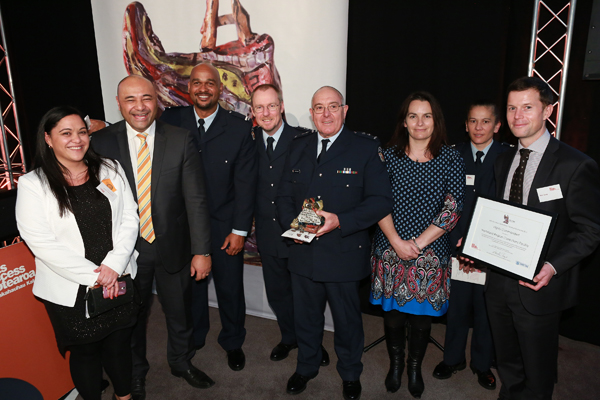Arts Access Aotearoa works with individuals and organisations to increase access to the arts. We’re also committed to working with Corrections staff, volunteers and community arts organisations so the arts – visual arts, creative writing, theatre, music, dance – can support the rehabilitative process of prisoners.
Great progress has been made in the area of performance this year, thanks in large part to a partnership we have with the University of Auckland. This has resulted in the visits of two international theatre practitioners, Curt Tofteland and Penny Glass, experts in the use of theatre and performance to inspire positive change in offenders.We are grateful for the opportunity to learn from and work with these two international practitioners. The learning was mutual and they gained insights into their own practice from their experiences in New Zealand.
You can read about the performance programme at Northland Region Corrections Facility and the impact it’s having on the prisoner participants.
Looking ahead to 2016, we’re pleased to be working with the Goethe-Institut New Zealand to organise a series of forums and events with German theatre practitioner Uta Plate. The Creativity in Corrections forums will be held in Auckland, Wellington and Christchurch over February and March.
Uta has been involved for many years in theatre projects and workshops with youth in detention, prisoners and asylum seekers. In April 2015, she facilitated Move-Dance-Write, a performance workshop in the Drug Treatment Unit of Arohata Women’s Prison in Wellington, and we’re looking forward to her return.
Literacy, reading and creative writing
Literacy is a key factor in increasing employment possibilities for offenders released back into the community. In Chile, says Penny Glass, almost all of its prisoners struggle to read. Here in New Zealand, the figure is somewhere between 50 to 70 per cent of prisoners with very low levels of literacy. It’s a no brainer that encouraging prisoners to read and participate in creative writing activities will inevitably increase literacy, improve writing skills and develop critical thinking.
Over the year, Jacqui Moyes, Arts in Corrections Advisor at Arts Access Aotearoa, has been working with established Wellington writers to support a creative writing project in Arohata Women’s Prison. There are also creative writing classes in Auckland Men’s Prison and Auckland Women’s Prison. And book groups meet in Christchurch Women’s Prison and Arohata Women’s Prison.
In 2016, we will provide ongoing support to these writers and projects as they continue to deliver engaging and high-quality programmes to prisoners.
Finding a "common language"
It’s important that all this work is both evaluated and documented so we and others working in this field can share information and learn from each other. I was interested to read about Griffith University’s research project Captive Audiences: the impact of performing arts programs in Australian prisons. In a summary report, it discusses the myriad performing arts projects in Australian prisons and points to the lack of research documenting them.
The research found that a key challenge was to find a “common language” for effective communication between arts organisations and correctional facilities. As a result, researchers have developed practical tools to guide arts practitioners wishing to take projects into Australian prisons. You can read more here.
 A highlight of the year is always the Arts Access Awards, which includes two leadership awards we present to Corrections staff and volunteers who use the arts as a tool supporting the rehabilitative process.
A highlight of the year is always the Arts Access Awards, which includes two leadership awards we present to Corrections staff and volunteers who use the arts as a tool supporting the rehabilitative process.
Waikeria Prison received the Arts Access Corrections Leadership Award 2015 for its arts programme, which includes kapa haka, whakairo (carving), music, poetry, raranga (weaving) and painting. You can listen to RNZ’s Spectrum programme and learn about Amelia Nurse’s very positive experience when she visited Waikeria Prison to find out what the arts have come to mean in the lives of the prisoners and the staff.
This is the final Arts in Corrections New Zealand newsletter for the year. There have been many achievements and successes by Corrections’ art tutors, staff and volunteers. Thank you for your commitment. We look forward to working with you again in 2016.
Arts Access Aotearoa’s office will be closed from noon 24 December until 9am 5 January 2016.


